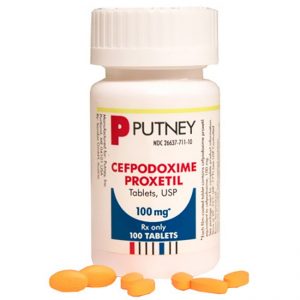Simplicef (generic name cefpodoxime proxetil) is an antibiotic veterinarian medication of the cephalosporin class, used to treat various infections caused by gram-positive and gram-negative bacteria. Particularly effective against bacteria like Escherichia coli, Staphylococcus intermedius, and Streptococcus canis [5], cefpodoxime proxetil is prescribed to treat infections of the ear, skin (like staph and yeast infections), respiratory tract, and bone. It is also effective against pneumonia, infected wounds, and UTIs like a bladder infection [5, 6].
Quick Information |
|
 Simplicef for Dogs |
Generic Name: Cefpodoxime proxetil
Brand Name: Simplicef Type: Cephalosporin Who can take it: Dogs, cats FDA Approved: Yes [2] Availability: Prescription only Available forms: Tablets, oral suspension, syrup |
Cefpodoxime proxetil primarily works by preventing the infection-causing bacteria from developing a protective cell wall, thus leaving it vulnerable, leading to its instability and eventual death [5, 6].
Be sure to follow the vet’s prescription; the dosage usually prescribed is 2.5-5 mg/lb (5-10 mg/kg) of the dog’s body weight, given once daily for a week, or till 3 days after the clinical signs of infection disappear [6].
It is always advisable to complete the course of treatment; otherwise, the infection may recur and grow resistant to this antibiotic [2].
In case of a missed dose, give it as soon as you remember. But, if it is almost time for the next dose, skip the one you have missed and continue with the regular dosing schedule [3].
Dogs that are allergic to the medication may exhibit symptoms like labored breathing, tiredness, vomiting, seizures, and hives.
Call the vet immediately, or get in touch with the ASPCA Animal Poison Control Center Helpline (1-888-426-4435) if you notice any of the above side effects or symptoms.
Cefpodoxime proxetil should not be given to dogs that are:
Make sure to let the vet know if your dog is taking any medications or supplements to avoid any chances of drug interactions. It is usually not given along with blood-thinners like neomycin and gentamicin. The antibiotic might increase the blood volume, causing certain adverse health effects if used along with uricosuric drugs (that get rid of the excess uric acid in the body) like probenecid.